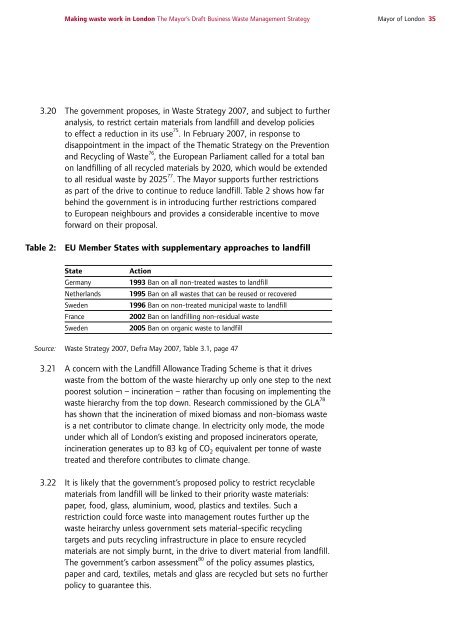Draft Business Waste Strategy PDF - london.gov.uk - Greater ...
Draft Business Waste Strategy PDF - london.gov.uk - Greater ...
Draft Business Waste Strategy PDF - london.gov.uk - Greater ...
You also want an ePaper? Increase the reach of your titles
YUMPU automatically turns print PDFs into web optimized ePapers that Google loves.
Making waste work in London The Mayor’s <strong>Draft</strong> <strong>Business</strong> <strong>Waste</strong> Management <strong>Strategy</strong> Mayor of London 35<br />
3.20 The <strong>gov</strong>ernment proposes, in <strong>Waste</strong> <strong>Strategy</strong> 2007, and subject to further<br />
analysis, to restrict certain materials from landfill and develop policies<br />
to effect a reduction in its use 75 . In February 2007, in response to<br />
disappointment in the impact of the Thematic <strong>Strategy</strong> on the Prevention<br />
and Recycling of <strong>Waste</strong> 76 , the European Parliament called for a total ban<br />
on landfilling of all recycled materials by 2020, which would be extended<br />
to all residual waste by 2025 77 . The Mayor supports further restrictions<br />
as part of the drive to continue to reduce landfill. Table 2 shows how far<br />
behind the <strong>gov</strong>ernment is in introducing further restrictions compared<br />
to European neighbours and provides a considerable incentive to move<br />
forward on their proposal.<br />
Table 2: EU Member States with supplementary approaches to landfill<br />
State Action<br />
Germany 1993 Ban on all non-treated wastes to landfill<br />
Netherlands 1995 Ban on all wastes that can be reused or recovered<br />
Sweden 1996 Ban on non-treated municipal waste to landfill<br />
France 2002 Ban on landfilling non-residual waste<br />
Sweden 2005 Ban on organic waste to landfill<br />
Source: <strong>Waste</strong> <strong>Strategy</strong> 2007, Defra May 2007, Table 3.1, page 47<br />
3.21 A concern with the Landfill Allowance Trading Scheme is that it drives<br />
waste from the bottom of the waste hierarchy up only one step to the next<br />
poorest solution – incineration – rather than focusing on implementing the<br />
waste hierarchy from the top down. Research commissioned by the GLA 78<br />
has shown that the incineration of mixed biomass and non-biomass waste<br />
is a net contributor to climate change. In electricity only mode, the mode<br />
under which all of London’s existing and proposed incinerators operate,<br />
incineration generates up to 83 kg of CO 2 equivalent per tonne of waste<br />
treated and therefore contributes to climate change.<br />
3.22 It is likely that the <strong>gov</strong>ernment’s proposed policy to restrict recyclable<br />
materials from landfill will be linked to their priority waste materials:<br />
paper, food, glass, aluminium, wood, plastics and textiles. Such a<br />
restriction could force waste into management routes further up the<br />
waste heirarchy unless <strong>gov</strong>ernment sets material-specific recycling<br />
targets and puts recycling infrastructure in place to ensure recycled<br />
materials are not simply burnt, in the drive to divert material from landfill.<br />
The <strong>gov</strong>ernment’s carbon assessment 80 of the policy assumes plastics,<br />
paper and card, textiles, metals and glass are recycled but sets no further<br />
policy to guarantee this.
















